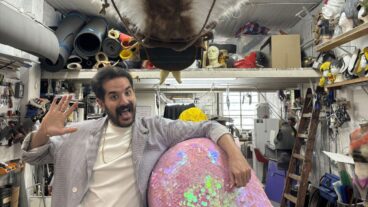Calling them a theater group wouldn’t do them justice. But describing them as a dance troupe or improvisational musical ensemble would also be incomplete. Let’s just say that the eclectic Tel-Aviv-based entertainment extravaganza Mayumana has made it everywhere, and now, after over a decade and thousands of performances before audiences worldwide, it is boldly embarking to make it there.
Where? Sinatra’s ‘there’ – New York City, naturally. At the Union Square Theater in Gramercy, audiences have been flocking to previews of Be, Mayumana’s new creation tailored specially for its American debut.
Considering its success in Israel, Europe and elsewhere, playing to audiences that have now collectively numbered over four million people, according to group estimates, it may be surprising that it took them this long to come to New York. The reason why they waited says volumes about the lofty creative vision and high standards that Mayumana has set for itself.
“Everything in it’s time,” says Roy Ofer, Mayumana’s producer and co-founder of the troupe. “We always dreamed of arriving in New York and… now is the right time… we wanted to come when we were ready, with the right people and the right theater and the right creation with the right team here,” he told ISRAEL21c.
Creation is the key word to describe what occurs on the stage when Mayumana shows up. Within each performance, there is dance, music, rhythm, slapstick comedy and, at times, intricate storytelling through physical acting, as well as other eclectic sensual potpourri.
“Mayumana belongs to the same family of performance theater as Stomp and the Blue Man Group,” notes Ofer. However, by design Mayumana is something unique, even from one performance to the next.
The simple reason for this, Ofer says, is because Mayumana constantly holds auditions for new members, and these inductees bring new talents to the table. The members’ skills are as diverse as their backgrounds. The team that was brought together for the New York production features performers not only from Israel, but also from Spain, Switzerland, Mexico and the Ivory Coast.
“Mayumana comes from the Hebrew word for skilled,” explains Ofer. “Each [new member] is coming with his own skills… we look for interesting people, each one with their own strong character, very specific talent and we try to implement them into the company and into the show.”
An example of this can be found in some of the contributions of the troupe’s two founders Boaz Berman and Eylon Nuphar. Before creating the group, Berman had a background as a scuba instructor, among other things. In a memorable scene in Be, a symphony of rhythm and dance is conjured from troupe members wearing diving flippers on their hands and feet. Nuphar, on the other hand, has belly dancing experience, and, sure enough, a short belly dancing routine has found its way into the narrative.
It is the challenge of the troupe to bring everyone’s skills to a common level, Ofer says. And so each member is both a student and teacher for the others. It creates a synergy that has already inspired accolades from local critics.
In his recent review, Steven McElroy of the New York Times remarked on the “mischievous humor” infused into the performance and marveled at the dexterity of the performers to embrace the varied talents of their fellow performers.
Some lesser-known critics have also given it their stamp of approval. In previews, the audience was given feedback cards to rate the show on a scale of one to 10, as well as offer their comments. As the lights came up on a Sunday matinee, sixth-grader Hanna Stein, one of numerous youths in attendance, circled “10” with her pencil, turned to her mother and exclaimed, “It was amazing!”
Ofer says it is common for adults to come to see Mayumana and then return with their children, an indication of the wide appeal of the show. “It is an adult show that is suitable for all ages.”
There are very few spoken words in Be, and even less in most of Mayumana’s earlier performance art. In fact, while one would be hard pressed to find specific Israeli elements in the show, taken as a whole, it’s unapologetically and unmistakably Israeli.
However, Ofer thinks that the roots that sprout through the multiculturism of Mayumana derive specifically from Tel Aviv.
“I think that more than being an Israeli show, it is a show that originated in Tel Aviv. Tel Aviv is a very open city, very vibrant, it’s very colorful. It’s a fusion. It’s a melting pot of a lot of cultures, it is a very alive, 24-hour city,” he said.
Once the lights go down however, and the performance begins, geography becomes irrelevant, as the audience is swept away amid the artistic stimuli on the stage. Ofer says that the most gratifying response that he gets from the performances over the years is when people tell them they were “charged up” from the “pure joy” of the show.
“What we enjoy most is to touch people during the show,” Ofer says, “that by the time the audience leaves the performance, they are a bit closer in that sense to ‘Be’ themselves, to do something creative, even a little thing. Everybody can. All of us can. You don’t have to be a great drummer, or a great singer or a great dancer, but connecting to this creative ability in the sense we believe it makes us better, feel better with ourselves.”












